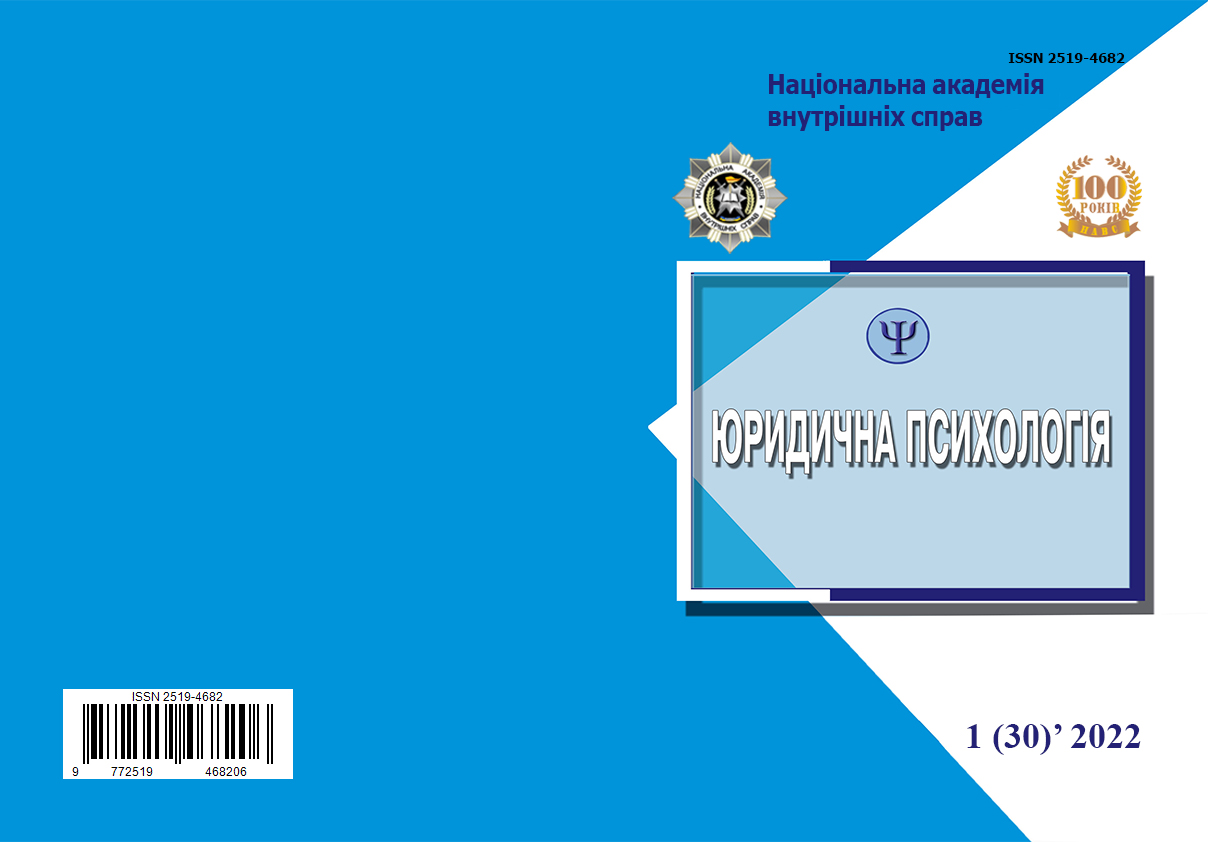Theoretical Fundamentals of the Rational Decision-Making Process by Representatives of Law Enforcement Authorities
Abstract
The purpose of the article is to determine the theoretical foundations of the rational decision-making process in the professional activities of law enforcement authorities. The methodological basis of the study is the general theory of decision-making, based on differentiation and integration of the axiomatic theory of utility and maximization of the rationality of scientific heuristics for decision-making process. The scientific novelty of the article is to highlight the basic concepts of behavior in decision-making process with various types of explanations of factors and mechanisms of behavior of law enforcement officers. Factors and mechanisms of group decision-making are analyzed in order to optimally rationalize it and overcome uncertainty. It has been proven that a rational decision-making process based on group dynamics is effective in reducing risk and decrease the number of errors in the professional activities of law enforcement officers. The conclusions of the article are to substantiate the effectiveness of decision-making process based on team and individual approaches in the professional activities of law enforcement officers. The article describes the starting point of decision-making in complex, time-limited, uncertain, ambiguous and changing situations faced by law enforcement officers in the course of their professional activities. It has been proven that a team approach reduces the risk that a decision may lead to undesirable consequences. Cognitive distortions of "mind traps" (heuristics) are described, which force to deviate from optimal strategies in decision-making due to subjective inferences. The role of an authority person (group leader) and professional experience in the rational decision-making process in the team, as well as the role of the team itself as a resource for decision-making process is the main.
Keywords: uncertainty; problem solving; difficult situations; organization; control; team decisions; cognitive biases.
Downloads
References
Problems of modern science and practice: Ist International scientific-practical conference (September 21-24, 2021). Boston, USA. Retrieved from https://isg-konf.com. doi: 10.46299/ISG.2021.II.I.
Science, theory and practice: IV International scientific-practical conference (October 12-15). (2021). Tokyo, Japan. Retrieved from https://isg-konf.com. doi: 10.46299/ISG.2021.II.IV.
Multidisciplinary academic notes. Science research and practice: XV International Scientific and Practical Conference (April 19-22). (2022). Madrid, Spain. Retrieved from https://isg-konf.com/multidisciplinary-academic-notes-science-research-and-practice/. doi: 10.46299/ISG.2022.1.15.
Methodological bases of studying the processes of general mental laws in human interaction with the environment. (2022). USA, Boston. Retrieved from https://primediaelaunch.com/. doi: 10.46299/ISG.2022.MONO.PSYCHOL.1.
Heuvel, C., Alison, L., & Power, N. (2014). Coping with uncertainty: Police strategies for resilient decision-making and action implementation. Cognition Technology and Work, 16(1). doi: 10.1007/s10111-012-0241-8.
Omand, D. (2022). Tselevoe myshlenie: priniatie resheniy po metodike britanskoy razvedki [Target Thinking: Decision-Making According to the Methods of British Intelligence]. (Trans). Moscow: Alpina Publisher [in Russian].
Shvets, D.V. Polenezalezhnist yak kharakterystyka zhyttiediialnosti politseiskykh [Field-independence as a characteristic of police officers vital activity]. Pravo I bezpeka, Law and security, 3(82), 219-230. doi: https://doi.org/10.32631/pb.2021.3.25 [in Ukrainian].
Tversky, A., & Kahnemanm D. (1973). Availability: A heuristic for judging frequency and probability. Cognitive Psychology, 5(1), 207-233.
Courtney, W. Mangus, & Prashant, Mahajan (2022). Decision Making. Critical Care Clinics, 38(1), 37-49. doi: 10.1016/j.ccc.2021.07.002.
Englich, B., Mussweiler, T., & Strack, F. (2006). Playing dice with criminal sentences: the influence of irrelevant anchors on experts' judicial decision making. Personality and Social Psychology Bulletin, 32(2), 188-200.
Janis, Irving L. (1972). Victims of groupthink; a psychological study of foreign-policy decisions and fiascoes. Boston: Houghton, Mifflin.
Kozeletskiy, Iu. (2003). Psikhologicheskaia teoriia resheniy [Рsychological decision theory]. Moscow: Progress [in Russian].
Kornilova, T.V. (2003). Psikhologiia riska i priniatiia resheniy [Psychology of risk and decision making]. Mosow: Aspekt Press [in Russian].
Feys ,Yi., Van Thienen, B., & Van den Bulck, Stijn. (2022). The complexity of police decisions: A collaborative study on police decision-making in Belgium. doi: 10.1093/police/paac030.
Lapesa Barrera, D. (2022). Decision Making. In book Aircraft Maintenance Programs (pp. 331-334). doi: 10.1007/978-3-030-90263-6_30.
Abstract views: 90 PDF Downloads: 108
- Authors reserve the right to authorship of their own work and transfer to the magazine the right of the first publication of this work under the terms of the Creative Commons Attribution License, which allows other persons to freely distribute published work with mandatory reference to authors of the original work and the first publication of an article in this magazine.
- Authors have the right to enter into separate additional agreements on non-exclusive dissemination of the work in the form in which it was published in the journal (for example, to post an article in the institution's repository or to publish as part of a monograph), provided that the link to the first publication of the work in this journal is maintained.
- The journal's policy allows and encourages the posting of articles by authors on the Internet (for example, in electronic storehouses of institutions or on personal websites), both before the submission of this manuscript to the editorial office and during its editorial processing, as this contributes to the creation of a productive scientific discussion and positively affects the efficiency and dynamics of citing the published work.




